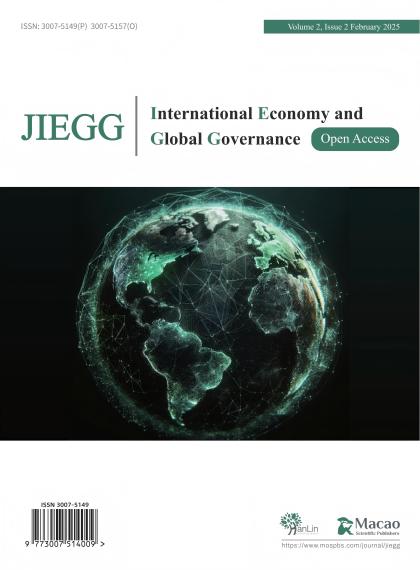-
Brautigam, D. (2024, July 20). The developing world’s coming debt crisis: America and China need to cooperate on relief. Foreign Affairs. Retrieved from https://www.foreignaffairs.com/china/developing-worlds-coming-debt-crisis
-
Chen, Q. W. (1998). IMF in the Southeast Asian currency crisis: New challenges and reflections. International Economic & Trade Exploration, 3, 33–36.
-
Chen, X. Y., & Qiu, W. D. (2024). “Digital capitalism” center–periphery structure: Morphological evolution, essential perspective, and real-world implications. The Economist, (1), 36–44.
-
Colerdek, G. W., & Liao, Z. (2020). World politics and economics after the pandemic. Foreign Social Sciences, (5), 73–81.
-
Ding, Y. F., & Zhao, K. (2014). Sovereign debt, financing capacity, and the rise and fall of nations: Responding to changes in the global debt landscape. European Studies, (1), 38–52.
-
Fischer, A. M., & Storm, S. (2023). The return of debt crisis in developing countries: Shifting or maintaining dominant development paradigms? Development and Change, 54(5), 954–993.
-
Gantheram, W., & Li, X. R. (2015). Lessons the IMF should learn from the Greek crisis. International Economic Review, (5), 163–165.
-
He, L., & Zhang, X. (2022). Pandemic shocks, global mass impoverishment, and China’s responses. Shanghai Economic Research, (7), 84–102.
-
Jiang, C. X. (2022). Reform and development pathways of the World Bank’s accountability mechanisms. International Law Studies, (5), 108–128.
-
Lawder, D. (2020, April 1). Mnuchin says IMF and World Bank funds won’t repay debts to China. Reuters. Retrieved from https://www.reuters.com/article/us-usa-china-debt/mnuchin-says-imf-and-world-bankfunds-wont-repay-debts-to-china
-
Li, G. X., Shi, Y. Y., & Cao, G. X. (2018). Topology structure based on detrended cross‐correlation coefficient of exchange rate network of the Belt and Road countries. Physica A: Statistical Mechanics and its Applications, (509), 1140–1151.
-
Li, J. (2023). “Xinhua Washington Consensus” and the transformation of American economic strategy. International Studies,(5), 48–70.
-
Li, J. J., & Lin, F. L. (2022). Global financial governance: Driving forces, intrinsic defects, and logic of change. Social Sciences, (4), 120–132.
-
Liao, F. (2020). Legitimacy dilemma of global financial governance and responses. Law Studies, (5), 37–54.
-
Liu, M., & Niu, W. G. (2023). U.S.–Japan–India–Australia economic “Cold War” thinking challenges to the Belt and Road Initiative: Current status, drivers, and suggestions. South Asian Quarterly, (2), 74–92.
-
Shan, S. (2023). Reframing the Western world’s sanctions on Russia from the perspective of the “other.” International Relations Research, (2), 61–79.
-
Shahzad, H., Raazia, G., & Sabeeh, U. (2023). Role of financial inclusion and ICT for sustainable economic development in developing countries. Technological Forecasting and Social Change, 194.
-
Strange, S. (2019). States and markets (3rd ed., Y. Y. Yang, Trans.). Shanghai People’s Publishing. (Original work published 1988)
-
Sun, J. S. (2022). Global development governance and the enhancement of China’s governance discourse power. World Economy and Politics, (12), 4–31.
-
Tian, Y., & An, Y. N. (2023). Mechanism choices in the weaponization of international institutions. World Economy and Politics, (11), 24–60.
-
Wang, J. Q., & Huang, M. B. (2022). Financialization of the world economy and the enforcement mechanism of sovereign debt responsibilities. Diplomatic Review (Journal of the China Foreign Affairs University), 2, 87–109.
-
Wang, Q. Z., & Li, J. L. (2023). The political economy of debt relief by developed countries to developing countries: Capital logic and participation constraints. Nankai Economic Research, (12), 47–64.
-
Wang, Z., & Feng, K. (2024). Political-economic explanations for the new round of debt problems in developing countries: “Debt intolerance” and global governance dilemmas. Diplomatic Review (Journal of the China Foreign Affairs University), (4), 115–154.
-
Wei, M. (2023). Issues and trends facing the world economy under high inflation. Contemporary World, (10), 46–51.
-
Wu, S., Sun, L. Y., & Xiong, W. T. (2023). Sovereign debt in developing countries: A systematic, comprehensive, and effective integrated resolution framework. Latin American Studies, (2), 2–17.
-
Xu, Q. Y., & Xiong, W. T. (2022). Risks of a global “stagflation‐type” debt crisis: Post‐pandemic global economic outlook. Financial Forum, (1), 3–8.
-
Yue, S. S. (2024). Evolution of international institutional change and discourse power patterns: The case of global economic governance. Northeast Asia Forum, (2), 98–113.
-
Zhao, H. F. (2017). Impact of RMB’s inclusion in the SDR on China and the IMF. Economic System Reform, (3), 136–141.
-
Zhao, X., & Jin, C. R. (2023). Structural characteristics of the international financial system and financial security governance. Journal of Fujian Normal University (Philosophy and Social Sciences Edition), (1), 57–67.
-
Zhou, S. (2019). IMF governance flaws, root causes, and paths for reform. International Trade Exploration, (10), 108–118.
-
Zhou, S., & Fu, Z. (2022). Fintech and transformative change in the global financial governance system: A re‐exploration based on international financial public goods theory. Northeast Asia Forum, (6), 105–121.
-
Zhou, Y. Y. (2020). The politicization of developing‐country debt issues: Impacts and reflections. International Outlook, (1), 85–107.

